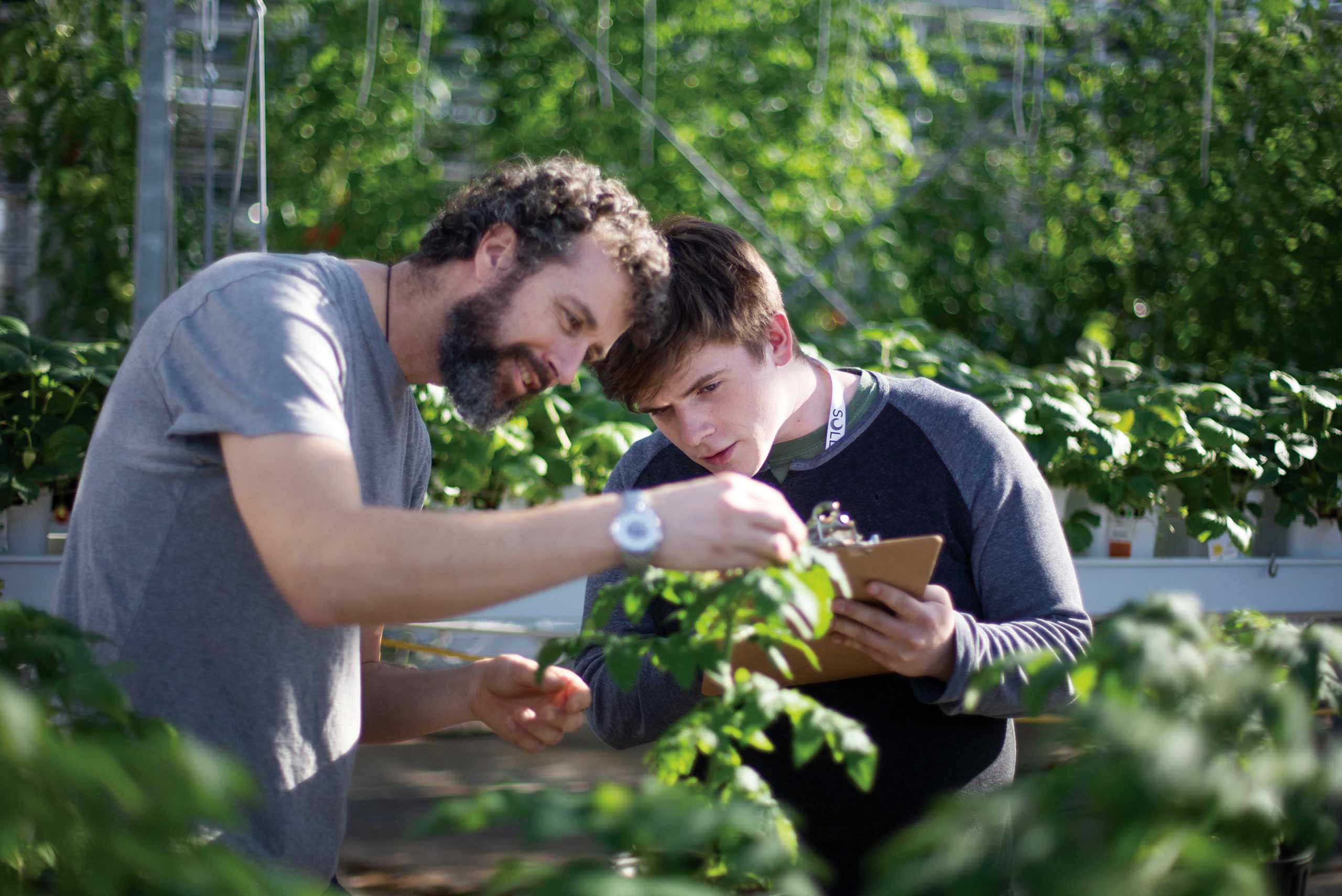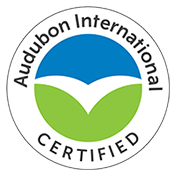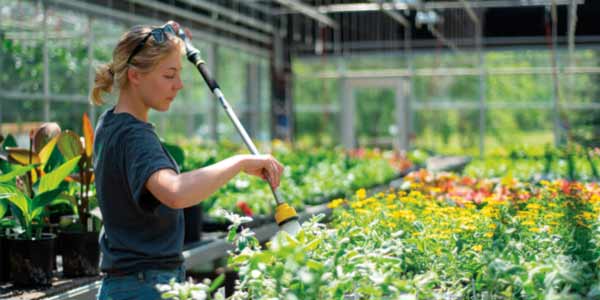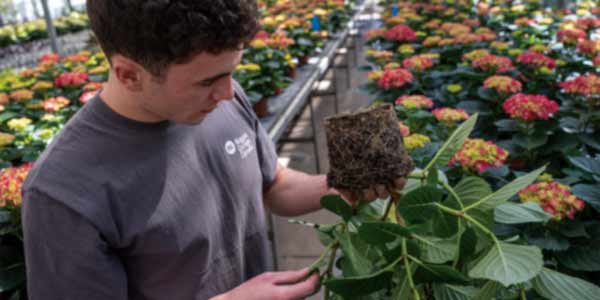- Students applying to Environment and Horticulture programs are often required to tolerate physical activity such as walking over uneven terrain, standing, bending, lifting, and carrying equipment.
- These expectations are reflected in our coursework, and applicants of this program should be highly motivated and have an appropriate level of fitness when entering this program.
About this program
-
Credential Awarded: 2 Year Diploma
-
Campus: Niagara-on-the-Lake
-
Code: 0111 P0111
-
Delivery Length: 2 Years
This designation means the program satisfies the field of study requirement established by Immigration, Refugees, and Citizenship Canada (IRCC). Graduates of eligible programs at designated learning institutions may qualify to apply for a Post-Graduation Work Permit, enabling them to gain Canadian work experience.
Note: PGWP eligibility does not guarantee approval of a work permit application. All applications are subject to IRCC's requirements and assessment.
Who are you?
- I am a domestic applicant. *
- I am an international applicant.
Your education at Niagara College begins with your application. We're here to help make the process easy!
- Carefully read the Admission Requirements tab to make sure you meet the program requirements.
- Check the Availability tab to see whether or not the program is accepting applications, and what start dates are available.
- Complete an application online through ontariocolleges.ca.
- Our Admissions Office will acknowledge your application has been received and will provide you with your NC Student ID number and details on your next steps.
Your education at Niagara College begins with your application. We're here to help make the process easy!
- Carefully read the Admission Requirements tab to make sure you meet the program requirements. Official, translated high school and/or post-secondary transcripts, proof of graduation and proof of English proficiency will be required.
- Check the Availability tab to see whether or not the program is accepting International applications, and what start dates are available.
- For next steps in the application process please visit international.niagaracollege.ca/how-to-apply/.
- Complete an application online through our Online Application Form.
- Niagara College will send you or your agent a confirmation of receipt via email within 48 hours of receiving your application.
By Email
Reach out to us using our contact form and we'll respond within regular business hours.
Contact UsOne-on-One Session
Have questions about this program or NC? Speak with a friendly Student Recruiter!
Book a One-on-One SessionRequest Program Information
Want to receive more information about this program? Join our email list to receive program and event updates!
On-Campus Tours
Book a tour at one of our campuses and explore our incredible learning and service spaces in-person!
Book an On-Campus TourVirtual Tours
Take a self-guided, virtual walking tour of our campuses and explore our labs and common spaces.
Take a Virtual TourInformation Sessions
Join us for an information session and explore the pathways and programs offered at NC!
Register for an Info SessionOverview
Do you want to contribute to the growth and maintenance of a sustainable environment?
As a Horticulture Technician you are focused on sustainable growing techniques and maintenance practices to help increase the biodiversity of the urban/suburban landscape. This program starts in September.
Courses
| Code | Course Name | Credits |
|---|---|---|
| HORT1003 | Deciduous Trees and Shrubs | 3 |
| HORT1004 | Horticulture Practices and Operations | 3 |
| HORT1006 | Nursery Management | 2 |
| HORT1018 | Landscape Graphics and Design | 3 |
| HORT1007 | Plant Science I | 3 |
| MATH1100 | Mathematics for Horticulture | 3 |
| COMM1101 | Language and Communications | 3 |
| Code | Course Name | Credits |
|---|---|---|
| HORT1008 | Evergreen Ornamentals | 3 |
| HORT1009 | Horticulture Entomology | 3 |
| HORT1015 | Plant Science II | 3 |
| HORT1021 | Landscape Design Build | 3 |
| HORT1248 | Greenhouse Production Science | 3 |
| COMM1250 | Advanced Communications for Horticulture | 2 |
| Elective Information | ||
|
Completion of additional General Education elective 1 course required |
||
| Code | Course Name | Credits |
|---|---|---|
| COOP1125 | Co-op Work Term | 0 |
| Code | Course Name | Credits |
|---|---|---|
| HORT1230 | Annuals and Herbaceous Perennials | 3 |
| HORT1241 | Sustainable Urban Arboriculture | 3 |
| HORT1245 | Applied Plant Pathology | 3 |
| HORT1316 | Turf and Weed Management | 3 |
| HORT1307 | Nursery Production Practices | 3 |
| HORT1318 | Pest Management | 3 |
| Elective Information | ||
|
Completion of additional General Education elective 1 course required |
||
| Code | Course Name | Credits |
|---|---|---|
| HORT1283 | Sustainable Food Production | 3 |
| HORT1298 | Fruit Production | 3 |
| HORT1341 | Advanced Urban Arboriculture | 3 |
| HORT1422 | Horticulture Business and Sales | 3 |
| HORT1477 | Sustainable Landscape Management | 3 |
| HORT1317 | Architectural Green Spaces | 3 |
| Elective Information | ||
|
Completion of additional General Education elective 1 course required |
||
Learning Outcomes Term: 1264
Prepare soil according to the type of plants, how they interact in a variety of environments, and the maintenance required to ensure the viability of crops.
Perform maintenance of plant species utilizing economic, social, and environmental horticulture practices.
Participate in the design, preparation, planting, and maintenance of horticultural displays that meet the project needs.
Perform installations and constructions according to the horticultural setting and goal.
Implement proactive and restorative maintenance procedures for plants, property, landscapes, and equipment.
Identify plants and plant care requirements for a variety of settings and purposes.
Recognize the potential environmental impacts of projects to prevent environmental damage, promote and maintain healthy interconnected ecosystems.
Prepare an Integrated Pest Management plan to prevent, monitor and control insect infestation or disease found on the plants.
Contribute to the effective planning, implementation, and conclusion of horticultural projects and crop production.
Adhere to Occupational Health and Safety Act and the regulations that apply to this work.
Manage inventory to ensure products and services are available to meet operational needs.
Act in a professional manner, maintain professional relationships, and communicate effectively with clients, co-workers, supervisors, and others.
Develop strategies for ongoing personal and professional development to enhance work performance and career opportunities, and to keep pace with industry changes.
Act with respect for and reflect on Indigenous ways of knowing, being, and doing as they relate to horticulture.
Admission Requirements
Ontario Secondary School Diploma (OSSD), or equivalent including the following required course(s):
- English – any Grade 12 (C) or (U), or equivalent
Recommended Courses and/or Skills:
These courses and skills may help you succeed academically in this program, but they are not required for admission.
- Biology – Grade 11 (C) or (U) or Grade 12 (U)
- Chemistry – Grade 11 (U) or Grade 12 (C) or (U)
- Mathematics – any Grade 12 (C) or (U)
Selection and Ranking
Applications are evaluated based on the published admission requirements. When the applicant provides proof of meeting the requirements, an offer of admission can be issued, provided space is available in the program.
Learn more about admission decisions.
Program Requirements
Transportation
- Students are responsible for their own transportation in order to complete program requirements which may not be readily accessible by public transportation.
-
Program requirements could include co-ops, placements, volunteer requirements, practical labs, field projects, assignments, clinicals, or any other off-campus visits required as part of the program’s curriculum.
Computer Requirements
Students are responsible for ensuring that they have a Microsoft Windows-based desktop or laptop that meets or exceeds the following general requirements:
- A desktop or laptop running on an updated Microsoft Windows operating system (Windows 11 recommended).
- Minimum 256GB SSD storage and 8 GB memory (note that 16 GB memory is strongly recommended).
- An integrated or peripheral video camera, microphone, and speaker system.
- Reliable internet connectivity with Broadband capabilities. A minimum download speed of 10 – 50 Mbps is recommended.
Niagara College may not be able to provide support for systems different than the above specifications as provided software may not operate properly. Academic software for your courses will be made available for download and remote use. Access will also be provided to remote high performance computer labs if software downloads are not feasible.
Note: We do not provide support for Chromebooks or Apple products. (learn more)
The technology requirements indicate there is no support for Chromebooks or Apple products. Can I still take my program if I have a Macbook or Chromebook?
For most programs, the recommendation is to have a MS Windows 11 computer for an optimal experience and for ease of downloading academic software. The reliability of remote connections to college computers and software cannot be guaranteed for Macbook and Chromebook users.
The Microsoft Office suite products that are available free to Niagara College students though Office 365 do have versions that work with Macbooks and Chromebooks, and most internet-based applications will work as well. However, some program-specific software is designed to run on Windows 10/11, and the successful download of these applications cannot be guaranteed.
Our Learning Management System (LMS) at Niagara College is Brightspace, and while students can access Brightspace through an internet browser, for some assignments and tests there is a layer of security that uses a proctored browser. The proctored browser will not function on Macbooks or Chromebooks.
Students assume the risk of a compromised virtual experience if they choose to participate without the recommended technology.
Computer/technology requirements may be subject to change without notice.
All costs associated with program requirements are the responsibility of the student.
Back to TopAvailability
Legendfor intake status table
Open
Accepting applications
Waitlisted
Eligible applications will be placed on a waiting list
Closed
Not accepting applications
Suspended
No longer offered this term
The College reserves the right to cancel or make changes to any course or program, fee, procedure, or campus location at any time.
Back to TopPathways
Explore your pathway options What are pathways? for the Horticulture Technician (Co-op) program below.
-
NC Pathway
-
NC Pathway
-
NC PathwayThis program grants Advanced Standing to qualified graduates of:Niagara College — Greenhouse Technician (Co-op)
-
NC PathwayThis program grants Advanced Standing to qualified graduates of:Niagara College — Landscape Technician (Co-op)
For detailed information about these pathway options visit niagaracollege.ca/pathways/.
Applicants with previous postsecondary education will be assessed for transfer credits upon receipt of an official transcript from their previous institution. There is no fee for this service.
Tuition
The below is a tuition fees estimate ( what's this?) for the indicated start term. Tuition fees are set in accordance with the Ontario Ministry of Training, Colleges and Universities fee guidelines.
Year 1
Level one $3,234.19
| Fee Type | Fee Cost |
|
Tuition
|
$1,357.49
|
|
Ancillary Fees
|
$1,269.20
|
|
Material Fees
|
$607.50
|
|
Level one Total
|
$3,234.19
|
Level two $2,629.19
| Fee Type | Fee Cost |
|
Tuition
|
$1,357.49
|
|
Ancillary Fees
|
$939.20
|
|
Material Fees
|
$332.50
|
|
Level two Total
|
$2,629.19
|
Level three Co-op/Work Term
Co-op/work terms have no tuition cost, however the co-op fee(s) in previous terms covers administration of this term.
Year 2
Level four $3,166.69
| Fee Type | Fee Cost |
|
Tuition
|
$1,357.49
|
|
Ancillary Fees
|
$1,209.20
|
|
Material Fees
|
$600.00
|
|
Level four Total
|
$3,166.69
|
Level five $2,276.69
| Fee Type | Fee Cost |
|
Tuition
|
$1,357.49
|
|
Ancillary Fees
|
$879.20
|
|
Material Fees
|
$40.00
|
|
Level five Total
|
$2,276.69
|
We're helping make your NC dreams a reality.
To help fund your education access $1.5 million in scholarships and awards made available by our generous donors. You will be automatically considered for some awards, however other awards will require an application.
Explore Scholarships & BursariesAdvanced Tuition Tool
The tuition amounts provided are an estimate only ( what's this? ).
To generate a detailed fees calculation, which includes tuition, ancillary, and material fees for this or a different start term, please access the Advanced Tuition Tool.
Generate My FeesThe below is a tuition fees estimate ( what's this?) for the indicated start term. Tuition and estimated fees for International students are based on program type.
Year 1
Level one $11,336.70
| Fee Type | Fee Cost |
|
Tuition
|
$8,475.00
|
|
Ancillary Fees
|
$2,019.20
|
|
Material Fees
|
$842.50
|
|
Level one Total
|
$11,336.70
|
Level two $9,481.70
| Fee Type | Fee Cost |
|
Tuition
|
$7,975.00
|
|
Ancillary Fees
|
$939.20
|
|
Material Fees
|
$567.50
|
|
Level two Total
|
$9,481.70
|
Level three Co-op/Work Term
Co-op/work terms have no tuition cost, however the co-op fee(s) in previous terms covers administration of this term.
Year 2
Level four $10,769.20
| Fee Type | Fee Cost |
|
Tuition
|
$7,975.00
|
|
Ancillary Fees
|
$1,959.20
|
|
Material Fees
|
$835.00
|
|
Level four Total
|
$10,769.20
|
Level five $9,129.20
| Fee Type | Fee Cost |
|
Tuition
|
$7,975.00
|
|
Ancillary Fees
|
$879.20
|
|
Material Fees
|
$275.00
|
|
Level five Total
|
$9,129.20
|
We're helping make your NC dreams a reality.
Access over $200,000 in scholarships and awards.
Explore & ApplyAdvanced Tuition Tool
The tuition amounts provided are an estimate only ( what's this? ).
To generate a detailed fees calculation, which includes tuition, ancillary, and material fees for this or a different start term, please access the Advanced Tuition Tool.
Generate My FeesCosts and Dates
General information about other costs, due dates, refund policy, housing costs, and more can be found on the Niagara College International website.
What is your tuition estimate?
Your tuition estimation includes tuition, ancillary, and material fees based on a program and term. Fees may vary upon enrolment into specific courses that are outside of the core curriculum or elective courses. Fees for future terms (where fees have yet to be published) are estimates based on the current academic year fee structure.
Additional fees include textbooks and a parking pass (if parking on campus). Additional costs may be incurred for optional field trips, learning materials, equipment or clothing. All costs associated with program requirements are the responsibility of the student.
Note: For new programs tuition and fees may not yet be available. Typically tuition amounts are available in May for the next academic year. Please check back.
Co-op
A program with a co-op (co-operative education) component means that the curriculum combines an in-class education along with hands-on experience of working a job in the program's field of study.
During co-op work terms students are able to link what they learned in the classroom in a real workplace. Understanding the skills they've developed academically helps create a more meaningful college experience, and means they are better prepared for their career after graduation.
For Students
- Co-op terms are paid. Earn while you learn!
- Practice the skills you’ve learned in the classroom.
- Gain experience in your field of study before you graduate.
- Develop references and connections.
- Hone your skills with feedback from your employer.
For Employers
- Low cost with tax credits and other funding available.
- Hire for peak season, staff coverage, special projects, etc.
- Help prepare students with career-related work experience.
- Minimal training required.
- Proven recruiting strategy for future staff.




